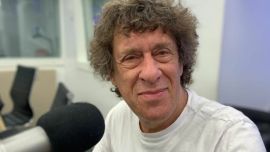In 2007 I presented Odessa: Die wahre Geschichte, the German translation of my book The Real Odessa, at Frankfurt University. I thought 15 people would come. Hundreds attended. The air was thick with unexpected enthusiasm.
Signing books after the talk, I noticed a tall, straight-backed, handsome man, prototypically German, wearing a very cool leather trench coat, patiently waiting to the side.
Finally he came up and said, in perfect Spanish with a Buenos Aires accent: "Hello, my name is xxxx xxxx." I was dumbfounded. "You are the son of xxxx xxxx!"
His father had been a fugitive SS doctor that I did not include in my book but whose case I had studied. "I travelled from Germany after my father as a child. I also had a passport with a false name,” he said. “I stayed at various churches and convents in Italy. I travelled alone, only nine years old. I lived in Buenos Aires until I was 21. I consider myself a porteño."
He had not been able to speak to his father about certain things. He had come to the talk in the hope that I might help him understand his own life story. "My father died and unfortunately I never found out, despite asking several times, if he was directly involved and to what extent, in the persecution of the Jews."
The man, whom I will call Berend, is one of the long series of sons, daughters and grandchildren of Nazis who have approached me over the years, telling me their stories and sharing documentation. I have entered into their lives with patience and caution.
Some people come in anger to defend the name of their father or grandfather. Others mix natural affection for them with a deep rejection of their crimes. Both those who defend and those who reject them are deeply affected by their past.
The grandchildren of one of the worst criminals who came to Argentina approached me for the first time in 2005. But it was only two years ago that they could bring themselves to donate the documentation they possessed to an institution, where it will be of benefit to historians.
In another case, a person from Germany, a relative of a Nazi who came to Argentina, contacted me by email and arrived without warning with a bag full of documents, photos and letters. Others have sent me scans of the Red Cross passports with false names under which they travelled to Argentina as children after the war.
Not everyone manages to get past their inherited karma. Berend from Frankfurt, after his initial approach, went silent. When in 2011 I found letters from his father in the archive of Bishop Alois Hudal in Rome, the German bishop who helped several Nazis flee with documents from the Pontificia Commissione di Assistenza, I shared them with him and he opened up a little more. But out of respect for his difficulty with the subject, I continue to withhold his name.
The same happened with relatives of Argentines who helped Nazis escape or find employment in Argentina. Some have faced the past of their relatives with courage. In other cases, anger prevailed.
The nephew of Oscar Ivanissevich, Argentina’s minister of education from 1949-1950, whose sister Magda Ivanissevich is documented helping the Belgian criminal Jean Jules Lecomte enter Argentina in a file I found at Argentina's Migrations office, wrote to a furious letter to Página/12 confirming that not only his mother, but that he himself had helped rescue Nazis, after the newspaper reported my finding.
Secrets and abominable facts
I can empathise with the difficulty of being the grandson of someone affected by the Nazi stigma. My own grandfather, Santos Goñi, was an Argentine diplomat in Vienna, Genoa, and later La Paz, Bolivia, during the 1930s and 40s. In The Real Odessa I relate how my grandfather complied with a secret order from 1938 prohibiting Argentine diplomats from granting visas to Jews escaping the Holocaust.
I found documents in the archive of Argentina's Foreign Ministry in which my grandfather rejects visas following the instructions of "Directive 11," the secret order signed by my grandfather's friend, former foreign minister José María Cantilo. Was it easy for me to deal with that documentation? No. I even met the magnificent Wolfgang Levy, who was denied a visa several times in 1940 by my grandfather, until Wolfgang, then a young Jewish man escaped from Berlin, managed to trick him and entered Argentina anyhow.
In 2003 I encountered unexpected helpers in my search for documentation on the Nazi escape to Argentina. President Néstor Kirchner, through his interior minister Aníbal Fernández, ordered the Migrations Office to open the Nazi entry documents in its archives.
Anibal Fernández received me at the Casa Rosada. I apologised, saying that I knew my search would stain General Juan Perón's uniform. He told me that times had changed and that he had to accept both the good and the bad side of Perón.
Then, on June 8, 2005, Kirchner himself presided over a ceremony at Casa Rosada, with Fernández and then-foreign minister Rafael Bielsa, to apologise on behalf of the Argentine government to the Jewish community for that 1938 order prohibiting granting visas to Jews.
I was asked to speak and said at the time that "Directive 11" was "a state secret that with the passage of time became a family secret, which made us descendants the totally involuntary custodians of an abominable fact that to this day remained hidden from the pages of history."
But was my grandfather a Nazi? No, he wasn't. On the contrary. He was fiercely anti-Nazi. Foreign minister Cantilo was also pro-Allied. But they were men of their time applying policies dictated by the Argentine State. That is why I have been upset with the recent accusations that have tried to paint Ramón Carrillo, Argentina's health minister from 1946-1954, as a Nazi sympathiser. I understand this family problem from the inside.
Some families resolve it in the manner of those who have approached me to say they loved their father or grandfather but want to draw a line separating themselves from his actions. Others persist in denial, feeling offended, refusing to deal with the documented facts and looking for institutions willing to clear the good name of their relative. Others, like Berend, remain in the middle. They would like to know, but they don't dare ask.
Ramón Carrillo was not a Nazi. But he belonged to a generation that professed certain philosophical and scientific ideas that have long fallen into disrepute. He was contaminated, like my grandfather, by a poison that spread to the remotest corners of the planet.
Contracts
Danish SS doctor Carl Vaernet disembarked in Buenos Aires on March 17, 1947, fleeing an almost certain prison sentence in Europe for his experiments on live humans in Buchenwald concentration camp attempting to find a "cure" for homosexuality. Barely a month after his arrival, on April 28, he signed a contract with Dr Carrilo to work at the-then secretariat of health, on a monthly salary of 1,500 pesos.
Earlier, in December 1943, Vaernet had signed another contract, with Reichsführer SS Heinrich Himmler, by which Himmler financed Vaernet's experiments and provided him with homosexual prisoners in Buchenwald to test the effectiveness of his "cure" in exchange for a share in the economic returns of his alleged invention.
Then, on March 8, 1948, Carrillo signed a new contract for Vaernet: "Mindful of the need for frequent and direct access to the information that the contracted technical officer, Dr. Carlos P. Vaernet, has about his scientific specialisation, the National Secretary of Public Health, resolves: To place under the direct orders of the undersigned the contracted technical officer Dr. Carlos P. Vaernet, who currently provides services at the Directorate of Technological Medicine. Signed: Carrillo, Secretary of Public Health."
At that time Vaernet, with another former SS partner and with his son Kjeld Vaernet, also a doctor, both of whom remained in Denmark, was still trying to sell his "cure" – not to Himmler this time, but to American and British pharmaceutical companies. It seems unlikely that
Vaernet did not attempt to sell his "cure" to Carrillo as well.
It is up to each descendant how they handle their family's past. During my lecture tour of Germany some grandchildren became angry. At Götingen University a young man rebuked me: "Why should I keep hearing about things my grandfather did? Why should we keep paying reparations to the Jews?"
I carefully considered my response and said: "At your point in this story it is optional to assume responsibility or not. If you do assume responsibility, the issue ends with you. On the other hand, if you decide to avoid responsibility, even if it's for something in which you played no part, the subject will keep coming up for those who follow you. Because the truth, until it comes out, will not sleep."


























Comments